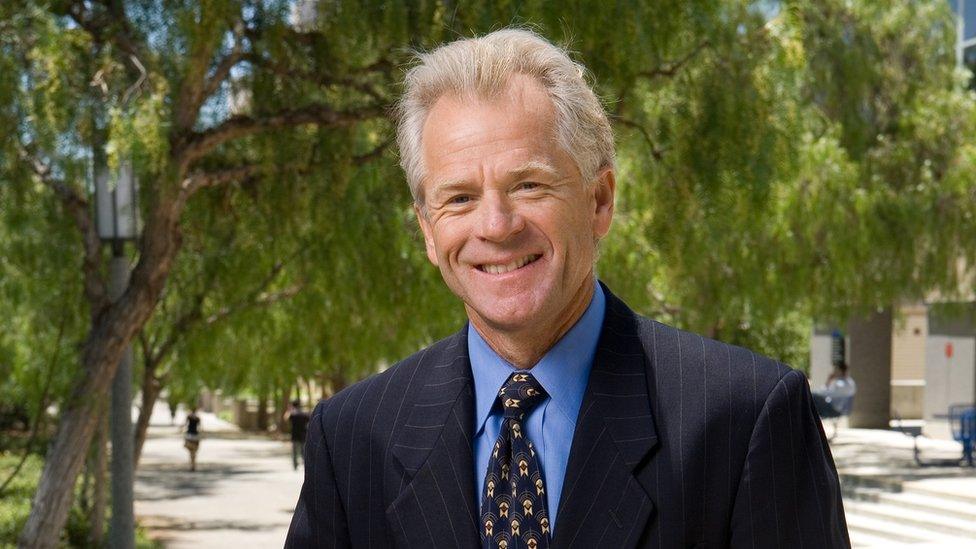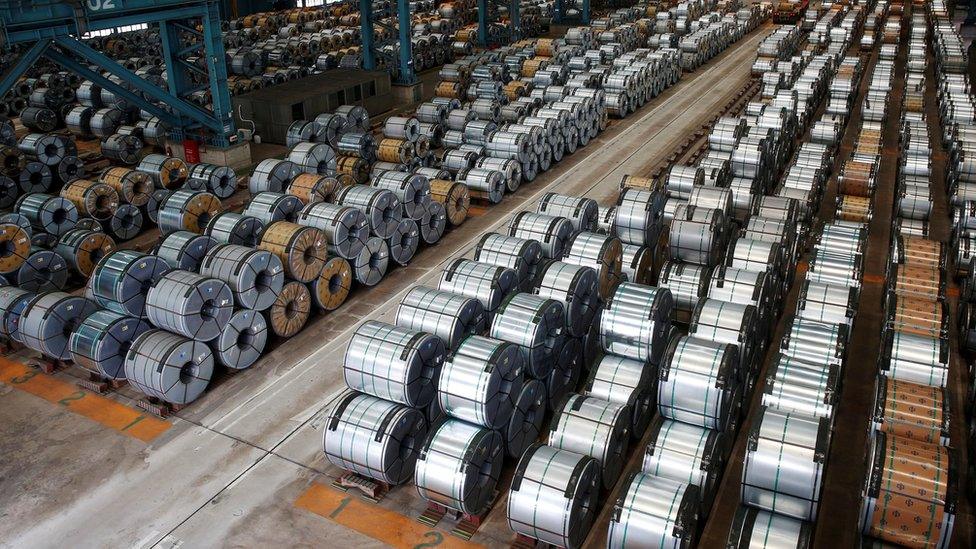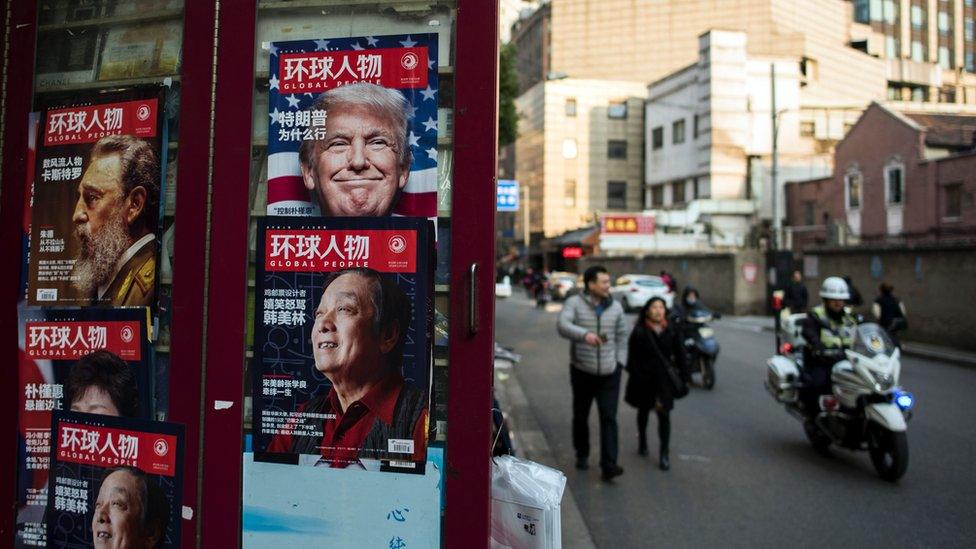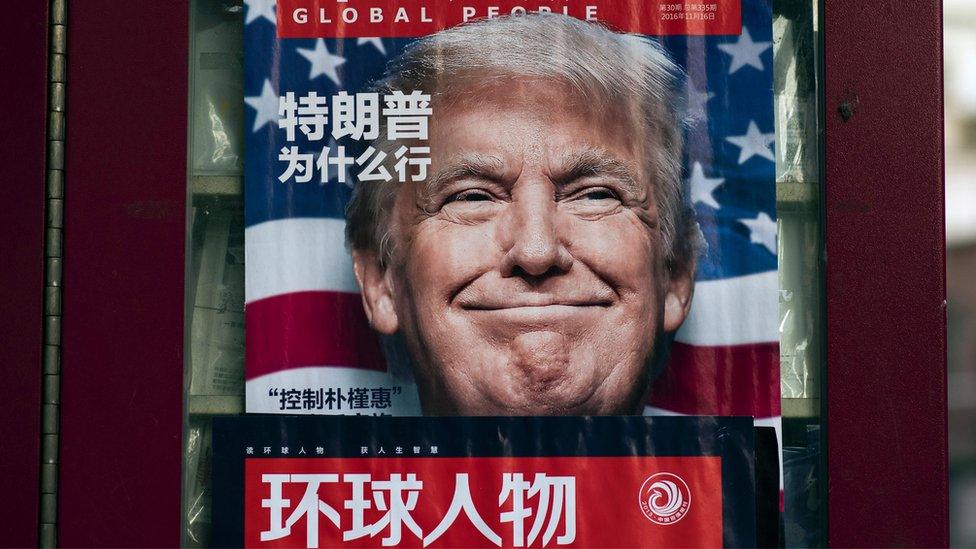Is Trump serious about trade war with China?
- Published

Mr Navarro is also an economics professor at the University of California, Irvine
To get a sense of what Peter Navarro, Donald Trump's pick for the head of his new national trade council may think about China, look no further than the film he made about the impact of China on the US economy.
The trailer for Death by China, external is a compelling watch, screaming statistics such as 5.5 million jobs and 57,000 factories have been lost to China.
It also alleges that China is ruining the US economy, and poisoning its children with toxic products.
In one particularly bold scene, a knife emblazoned with the words "Made in China" sears through the heart of the United States, leaving a trail of blood smeared against the US flag.
Mr Navarro certainly has a flair for drama.
But then so does his new boss, Donald Trump.
And with this appointment, it would appear that Mr Trump has no qualms about announcing to the world that he's not afraid of a trade war with China.
But it may also be clever posturing.
In his 1987 book "The Art of the Deal", Donald Trump has this to say about the Chinese:
"I've read hundreds of books about China over the decades. I know the Chinese. I've made a lot of money with the Chinese. I understand the Chinese mind."
So was this appointment Mr Trump's way of striking a better deal with the Chinese?
"China has been gaming the international system for a very long time," Gordon Chang, author of "The Coming Collapse of China" told me. "It's clear Mr Trump wants to change that. Good relations to him means getting what you want, and that's actually quite close to the Chinese point of view."

China is accused of flooding markets like the US with cheap materials like steel which does little to develop goodwill.
That's not how the Trump team is selling it though, and it is unlikely that the Chinese will see it that way either.
Mr Trump's transition team says the new national trade council is all about making US manufacturing "great" again, in an attempt to bring American jobs home. As the trade council's head, Mr Navarro will help to set the US trade agenda, and will be expected to come up with policies to shrink the US's trade deficit with China, and other nations.
But given most economists say focusing on bringing US jobs back isn't practical, how much can he actually do?
"Trump seems to be going through with the 'get tough on China' plan, but he's fighting the wrong battles, ones from the 1990s," says Fraser Howie, a long time China observer. "The outsourcing of jobs isn't the battle now, it is intellectual property protections and market access."
But none of that plays particularly well with the masses, and certainly doesn't have as catchy a title as "Death by China".

At the heart of Mr Navarro's premise is that globalisation has benefited China, and not the United States. He, and those who share his view, say that in the years since China joined the World Trade Organisation in 2001, the United States has seen its economic growth decline while China's, albeit coming from a very low base, has boomed.
"This [appointment] is not a good sign, not a positive sign," says Professor Xie Tao, at the Foreign Studies University in Beijing.
"There was a kind of euphoria over Donald Trump's victory in China, and many Chinese were writing about how having him in the White House would be good for US-China relations. But in the last few weeks we've had a sudden turnaround, an about-face."
"So this appointment of Mr Navarro is a signal to Beijing, and to his domestic constituents," added Professor Xie. "There are lots of ways to punish China on trade. Mr Trump is saying: 'I'm actually quite serious about what I've said, and I'm going to follow through with this'."
China is unlikely to take antagonism from the US lightly.
President Xi Jinping also has a domestic population to placate, and Mr Trump's tweets of late have riled the Chinese public no end.
"Trump is not behaving as a president who will become master of the White House in a month," was the assessment in an editorial from the Chinese state mouthpiece the Global Times, earlier this month.
"He bears no sense of how to lead a superpower…Since he has not taken office, China has kept a calm attitude toward his provocative remarks. But if he treats China after assuming office in the same way… China will not exercise restraint."
Those sound like fighting words to me. Let the trade-war games begin.
- Published22 December 2016
